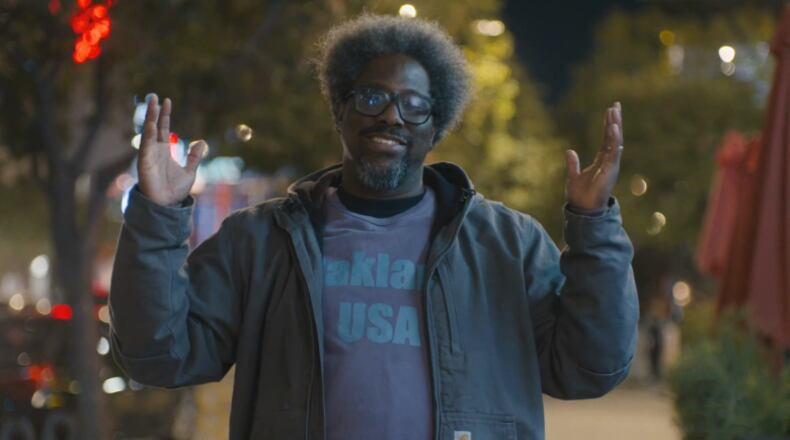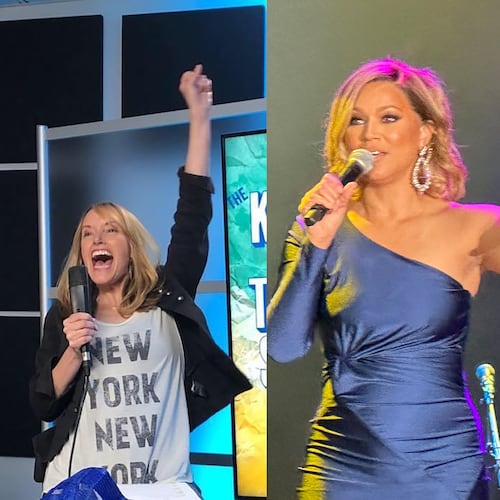Comedian, activist and CNN host W. Kamau Bell admits he’s no athlete and proved it multiple times this upcoming season on his Emmy-winning magazine series “United Shades of America,” courtesy of taping an episode focused on sports.
In one hour in Boston, he gets aggressively wrestled to the ground, is exceedingly outpaced by a track star, drops many balls thrown at him and awkwardly rows down a river.
“If you’re going to try to dismantle racism, you may as well do some pratfalls,” mused Bell in a recent interview with The Atlanta Journal-Constitution. “I did the wrestling and rowing on the same day. It took me a week to recover from that episode. I had some feelings. But my kids did find it funny seeing me get flipped.”
The most salient and newsworthy of the seven episodes is the one about what it means to be “woke,” which debuted this past Sunday night and will re-air on CNN this Saturday at 10 p.m.
The term “woke” is decades old and was exclusively used by Black folks for a time as a warning. As Bell says in the episode, it was “a creative way for one Black person to say to another, ‘Be smart, stay aware, America is dangerous.’”
Then the Michael Brown shooting by a police officer in 2014 in Ferguson, Missouri, led to a hashtag on “Black Twitter” “#StayWoke.” But as Bell noted, Black Twitter is seen by everyone. So “woke became the hymn for latte liberals,” he said, who wanted to show off “performative social justice.” Blacks, he said, stopped using it seriously.
Then conservatives grabbed the word and it became a pejorative, he said, “for anything America sees as a threat.” And it’s how the term “critical race theory” became misunderstood and twisted into the same rubric as “woke.” The episode attempts to clarify what actually CRT is and what it doesn’t mean for public schools, but he knows he is often preaching to the converted on CNN.
“I hope it helps people who are just on the fence,” Bell said. “The news treats them like pinballs. At least they will no longer be confused by the definition, that it’s not some global conspiracy concocted by George Soros. I want your random conversations about the news to be better.”
Another episode that hits close to home for Bell is one about the incessant wildfires in California and the inexorably negative impacts of climate change. There are plenty of people, he said, who throw up their hands and say, “It’s too late. Enjoy what you have left!” But he explores solutions, including controlled fires that indigenous people have promoted for centuries.
Bell has indeed worked hard to incorporate indigenous people into multiple episodes and this season, he did a second stand-alone episode focused on native Americans seeking to get their land back. And to build food independence, one tribe raises bison, some of which are killed each year. Bell watched a sharp-shooting woman kill one. “It wasn’t fun to see it killed,” he said, “but all the food will be given away for free and eaten by people in the reservation.” They also goaded Bell into sampling bison bile.
He made a face and politely said on camera that it tasted like medicine. “I felt like I was taking a potion that would make me a superhero,” he joked. “My mutant power might reveal itself eventually.”
The final episode of the season focuses on the impact of tourism on Hawaiians and features Bell trying to be athletic yet again, this time on a surfboard. After numerous takes of him falling into the water, the camera crew told him they only had time for one more try. Miraculously, he stayed on the board for 10 seconds.
“I really felt a sense of accomplishment,” he said. “Women on the beach were watching. There were cops on jet skis. The dude from CNN didn’t drown! My kids were cheering!”
WHERE TO WATCH
“United Shades of America”
10 p.m. Sundays on CNN, repeated at 1 a.m. and 10 p.m. the following Saturday
About the Author
Keep Reading
The Latest
Featured




